The company’s reputation is often based on how well it treats its customers. The front office contributes significantly to shaping customer experience and driving business success. Businesses rely on them to provide excellent customer service and build strong customer relationships which is not an easy task.
Front-office employees generally experience high levels of stress because they often face bad-tempered customers. Maintaining efficient and successful operations during peak business periods and keeping up with rapidly changing customer expectations can be extremely challenging. Fortunately, there is a way for businesses to overcome these challenges: outsourcing front-office operations.
Before diving into the benefits of outsourcing the front office and the costs involved, let us quickly differentiate the front-office and back-office functions. The front office manages customer interactions such as marketing, sales, and customer service while the back office tasks are mostly administrative like accounting, HR, and IT.
Why Should You Outsource the Front Office?
Outsourcing the front office offers a range of benefits. Here are several compelling reasons why you should consider it.
Cost Savings
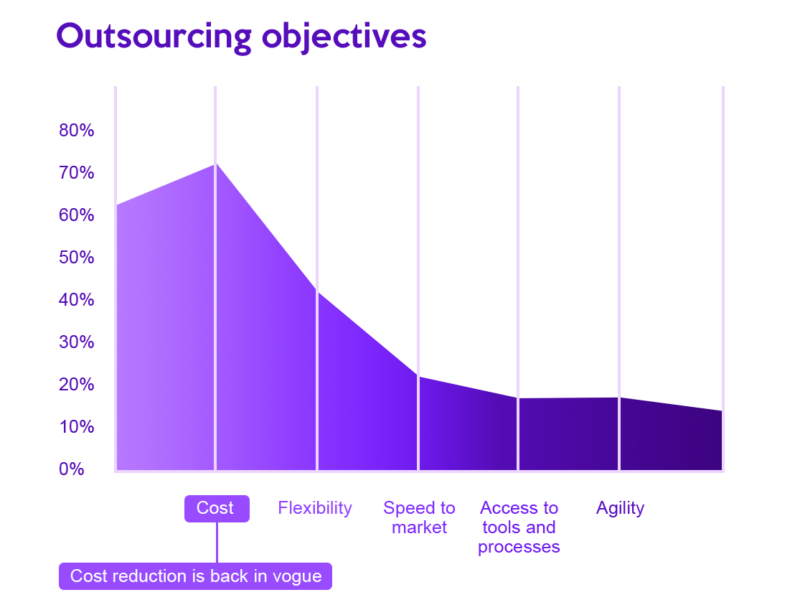
Labor costs such as salaries, benefits, and overhead costs are significant expenses for companies. Outsourcing the front office to service providers in countries with lower labor costs might help businesses save money. It reduces the costs associated with recruiting, hiring, training, and onboarding front office staff.
By outsourcing front office services, businesses can make use of the infrastructure and technology that the service provider have without incurring the initial capital costs or ongoing operational expenses of sustaining in-house operations.
Additionally, it enables businesses to scale up or down operations depending on the business needs without incurring significant costs.
Reduced Errors
Front office service providers have experienced professionals who are highly skilled in managing customer interactions. Because of their expertise and experience, they are capable of handling a variety of customer inquiries, issues, or requests which can increase accuracy. They usually follow an established business process and procedure which help in ensuring consistency, accuracy, and efficiency in handling their customer interactions.
Also, they have robust quality control systems in place that help in identifying and addressing errors in real time and reduce the chances of errors being repeated.
Access to Expertise and Experience
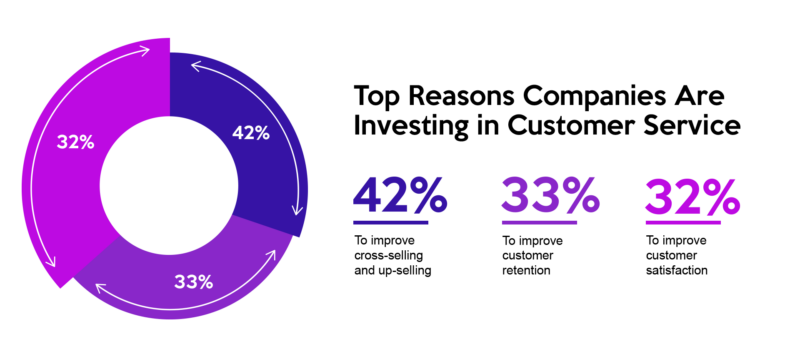
Outsourcing the front office can give businesses access to expertise that may not be available internally. Service providers that specialize in front office operations such as call center or customer service, frequently have experienced staff that is excellent at managing customer interactions effectively. By outsourcing front office tasks to such skilled customer service agents, companies may guarantee that their customers receive a high level of assistance while increasing cross-selling and upselling, customer satisfaction, and loyalty.
Focus on Core Competencies
By outsourcing non-core functions to a third-party service provider, businesses can free up their internal resources, time, and effort to concentrate on their key activities. Small and medium-sized businesses which might not have the expertise or resources to manage all facets of their operations, may find this to be beneficial. Focusing on the business’s core activities also gives them a competitive advantage in the marketplace.
Global Expansion
Companies aiming to expand internationally may find it particularly advantageous to outsource front-office functions. Companies may enter new markets, serve local clients, and overcome language and cultural barriers with the help of service providers with a global presence and language skills.
Time Savings
Outsourcing front-office services can help businesses save time in multiple ways:
Front-office service providers are experts in their field and can provide faster response times to customer requests and inquiries which can save businesses time on customer service.
There is no need to invest time and resources in training the employees to gain expertise in their tasks.
Service providers typically have established business processes that the company may adapt to streamline their front-office processes to operate efficiently and avoid trial-and-error.
What Impacts the Cost of Outsourcing the Front Office?
While outsourcing front-office services offers several advantages, the overall cost of outsourcing can vary significantly depending on several factors. Here are some of the factors that may impact its cost:
Size of the Company
Depending on the size of the company, the complexity of its front-office operations will vary. Larger companies usually have more complex front-office functions and require specialized skills and expertise. More complex tasks may require more resources and higher expertise, resulting in higher costs. The organization’s internal capabilities and resources for handling front-office tasks will also affect the cost of outsourcing. Companies may choose to outsource a single front-office function or a variety of front-office services, depending on their resources.
Level of Service Needed
Outsourcing a single function may be less expensive than outsourcing multiple front-office functions. The type and complexity of the task play also a role in the overall cost of outsourcing. When compared to more routine tasks like data entry or basic customer service, services that call for specific knowledge or expertise such as technical support, may attract higher prices.
Location
Service providers in different countries may have varying labor costs due to different wages and costs of living. For instance, outsourcing to countries with lower labor costs may result in lower overall outsourcing costs. The tax regulations in each country and the currency exchange rates will also affect the cost of outsourcing front-office tasks.
Customization
Customizing tasks to meet the specific needs of the business requires a high level of expertise and quality control from the outsourcing partner, resulting in higher costs. On the other hand, it might be more economical to outsource tasks that require little to no customization.
Technology and Infrastructure
When outsourcing front-office tasks, clear communication is essential. For instances where the service provider needs to invest in specialized software or communication tools such as video conferencing, instant messaging, and project management software to support front-office operations, the costs of outsourcing may be affected. Technology also helps in automating repetitive tasks, thus, freeing up the time of employees to do other higher-value tasks. While the service provider may charge additional fees for the use of these tools, the benefit will still outweigh the cost as it can improve productivity.
Contractual Arrangements
The cost of outsourcing front-office services can be affected by the contractual agreements made with the service provider, including the payment structure, pricing model, and terms and conditions. Different pricing models have varying cost implications. Other factors such as the contract duration, termination clauses, and intellectual property rights can also impact the overall cost of front-office outsourcing.
Level of Expertise and Quality
Service providers with a higher level of expertise and experience typically charge higher rates for their services. Because they have invested significant time and money in acquiring their expertise, their services could be more expensive compared to less experienced providers. Higher expertise may result in improved customer satisfaction and better quality outputs. This can have long-term cost-saving benefits because it lowers the possibility of rework, customer complaints, and potential business losses due to poor performance.
Average Cost to Outsource the Front Office
There are several front-office tasks that your business may need to outsource and the cost may differ for each service. Below are ballpark estimates for sample front-office positions.
For customer service, the outsourcing cost in the US may range from $25-$65 per hour per representative. You may be charged near the top of that range if you need technical expertise on specific systems. The lower end will do if all you need is someone to take orders or process applications.
For an appointment-setting service, the average cost is between $50-$100 per appointment range.
Keep in mind that these figures are only estimates. Providing an exact amount on how much outsourcing the front office costs could be challenging because several factors can affect the overall costs such as the rates of the service provider, their geographic location, and their level of expertise.
Outsourcing the Front Office vs. In-house Front Office – Direct Comparison
Initial Setup Costs
Outsourcing often involves entering into a contract with the service provider which may require an initial setup fee like minimum contract term or termination fees. They may also charge for the setup of the infrastructure, technology, communication systems, and other setup expenses.
Setting up an internal front office, on the other hand, requires investing in office space, furniture, and technology systems. Hiring and training your staff may also incur additional setup costs like recruitment expenses, salaries, benefits, and training programs. This may result in higher initial setup costs.
Ongoing Expenses
When outsourcing, you normally pay the service provider ongoing fees for their services which may include costs for staffing, infrastructure, technology, and other operational expenses. Depending on the usage and service level, these fees could change. Monthly or annual fees, SLAs, and additional charges for special services may also be part of the contract.
Managing front office operations internally will include ongoing expenses such as employee salaries, benefits, payroll taxes, training, and utilities. Expenses for software licenses and subscriptions, and maintenance of the IT infrastructure may also be a part of your ongoing expenses.
Total Cost of Ownership
In outsourcing the front office, the overall cost may include ongoing service fees to the provider, contractual obligations like minimum contract duration and termination fees, and vendor management costs which may involve monitoring their performance and ensuring contract compliance.
On the other hand, the costs of in-house front-office operations may involve ongoing expenses related to employee salaries, benefits, training, technology, infrastructure, and utilities. Your capital expenses may include upgrade and maintenance of technology systems and office space maintenance.
Other factors such as the quality and service level of front-office operations, risks associated with data security, and regulatory compliance, and strategic factors like overall business strategy, long-term objectives, and scalability should all be considered when evaluating the total costs of outsourcing the front-office compared to in-house operations.
Choosing the Right Front-Office Outsourcing Provider
Choosing the right front-office outsourcing provider is a crucial choice that has a significant effect on your company’s performance and customer experience. When choosing a front-office service provider, keep in mind the following important factors:
Expertise and Experience
Customer service, sales, and marketing are examples of front-office tasks that require expertise and familiarity with industry-specific processes and regulations. An outsourcing partner with an experience in your industry would be able to meet your specific needs.
Quality of Service
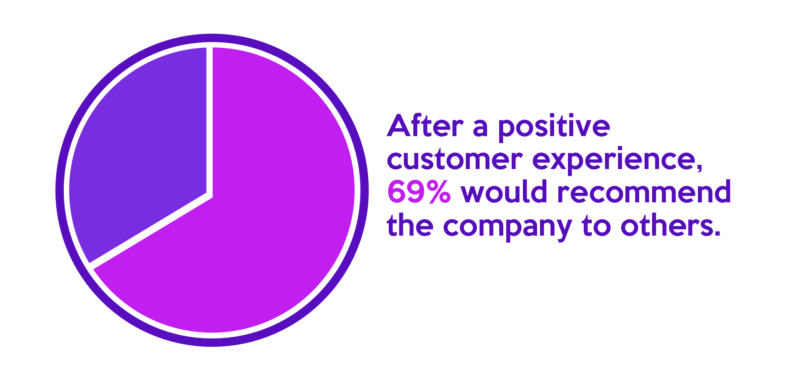
Choose a service provider who has a proven track record of providing excellent customer service and meeting performance metrics such as response time, customer satisfaction scores, and first-call resolution rate. To verify their service quality, ask for references.
Service Offerings
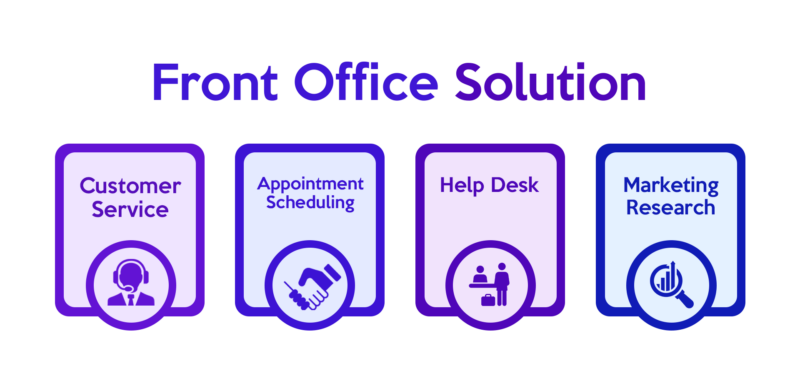
Evaluate the outsourcing provider’s service offerings. The front office can encompass a wide variety of tasks, including customer service, sales, marketing, reservation and booking, reception and front-desk operations, order management, relationship management, and more. Make sure the service provider is able to deliver the specific services you require to meet your business goals.
Technological Capabilities
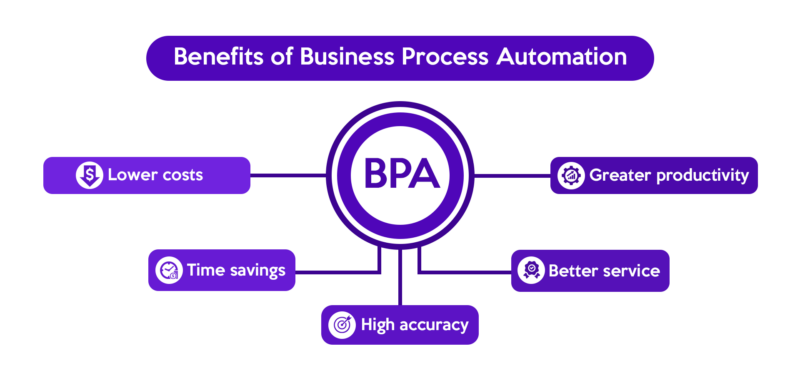
Technology solutions such as customer relationship management (CRM) software, call center systems, and analytical tools are frequently needed for the front office. It streamlines front-office processes while reducing manual errors, enables real-time interactions, and allows a seamless exchange of information between your front-office and back-office operations.
To drive operational efficiency and stay competitive in the dynamic landscape, evaluate the outsourcing company’s technological capabilities in supporting your business requirements.
Data Security and Compliance
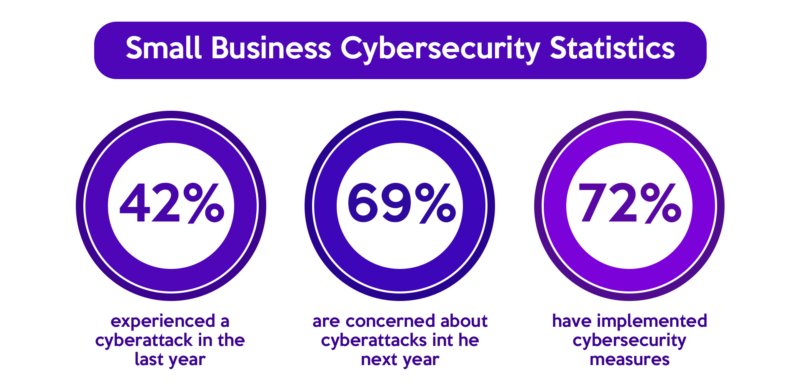
Data security and compliance are important considerations because when you outsource front-office functions, you are entrusting the outsourcing provider with sensitive customer information. Due to the sensitive nature of customer data, there are potential risks for data breaches, insider threats, or unauthorized access. Small businesses are often the targets of data breaches because data security may not be a priority on a strict budget.
Check the outsourcing provider’s implementation of effective data security measures and their compliance with relevant industry regulations and standards to safeguard customer data and protect your company’s reputation.
Cultural Fit
Front-office activities like customer service, sales, and marketing, involve direct interaction with customers. They serve as the face of your company.
The cultural fit between your organization and the front-office service provider can impact how well they are able to understand, represent, and uphold your brand values, customer service standards, and communication style. A cultural mismatch may result in inconsistent customer perceptions of your brand, misunderstanding, and miscommunication with customers which could potentially affect customer satisfaction and loyalty.
Front-office business process outsourcing has become an increasingly popular option among companies looking to streamline their front-office operations while reducing costs. Outsourcing the front office offers a wide range of benefits including cost savings, reduced errors, access to expertise, focus on core competencies, global expansion, and time savings.
Several factors can affect the overall cost of outsourcing such as the size of the company, the level of service and customization needed, the location of the service provider, technology, contractual arrangements, and the level of expertise and experience of the provider.
Despite the costs, many companies find that outsourcing front-office services can result in significant cost savings compared to maintaining in-house operations because it allows them to leverage the expertise and resources of the service provider while they focus on the business’s core activities. It is recommended to get cost estimates from different service providers and compare which one best fits your budget without sacrificing the quality of service your business will receive.
To ensure quality service delivery and a positive return on investment, businesses need to carefully weigh the costs and benefits of outsourcing front-office services. Careful planning, communication, and monitoring are all essential to manage expenses and maximize the benefits of outsourcing.



Leave A Comment
You must be logged in to post a comment.